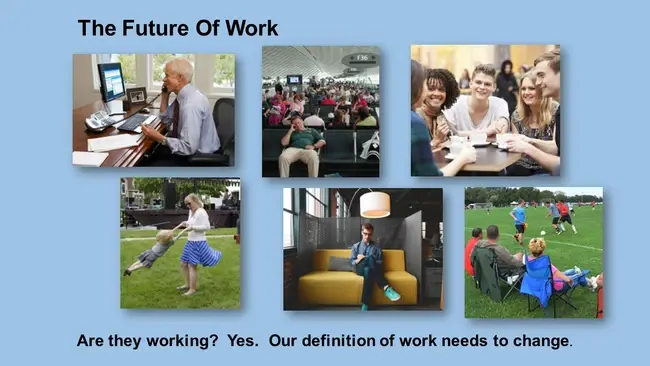It's a typical Post-Pandemic day on social media. There are a dozen articles posted about the need to return to a traditional office (RTO) and a dozen more posted by ‘brand-new experts’ on hybrid and flexible working about how the #FutureOfWork is and will remain hybrid.
The noise floor on this topic couldn't be louder, and people are entrenched in their positions. It seems like the polarization on this subject can’t get any worse.

It is important to realize that the evolution of the way we work is not a new thing, and it's not a pandemic thing. It is knowledge workers realizing that there is a better way to live life and still be extremely productive and successful in their careers. The pandemic, for all its horrors, only served to accelerate this evolution – like pouring fuel on a fire.
Do you need proof that this was happening before the pandemic? Well, maybe take a look at some of my old articles on LinkedIn. Here is my article on the subject from 2017 where I was years into the conclusion that our society's definition of "work" and "going to work" needed to change https://lnkd.in/er3q7rc . And here is my article from 2014 that predicted a pandemic was coming, and that everyone would need to be able to work remotely. https://lnkd.in/eVsPPT4y You can at least conclude that I’m not one of the 'brand-new' experts on the subject. I’ve been studying and commenting upon the future of work for decades.
As organizations try to plot a course to that future of work, it is just as important to recognize biases in the articles and surveys we read. The latest executive to claim that remote and hybrid workers ‘don’t work as hard’ as those in an office is the CEO of one of the world’s largest asset management firms specializing in real estate. Separately, a recent survey that reported 64% of CEO believe that we’ll all be back in a traditional office by 2026 is just as problematic, as the interviewees are likely all skewed to the top end of the socio-economic ladder, and the firm doing the interviewing is highly-paid management consultant. Heck, you can even open the standard newspaper of Wall Street on any given day and read a half-dozen articles about why flexible working is ‘bad.’
These biased reports can be contrasted by the actual facts that are emerging:
- While the CEO of one of the world's biggest banks publicly says remote working is bad, this article details how that bank is actually increasing their remote working program. https://www.bloomberg.com/news/articles/2023-10-20/jpmorgan-adds-more-fully-remote-roles-after-success-in-detroit
- A technology company that – with much fanfare – opened a cocktail bar in their office six months ago has just decided to close it down. Their CEO stated that it was not working to bring people back to the office, and that “the [traditional] office is dead.” https://sfist.com/2023/10/27/downtown-tech-office-shuts-down-its-free-cocktail-bar-for-employees-ceo-says-the-office-is-dead/ There are multiple other articles about how similar perks meant to attract people to offices when they don’t really need to be there are universally failing to lure people.
- While the world’s largest commercial real estate services and investment firm speaks publicly about the return to office movement, it states on its own website that “The Hybrid Workplace is Here to Stay.” https://www.cbre.co.uk/insights/articles/the-hybrid-workplace-is-here-to-stay
Change is hard, and rapid, pandemic-fueled change is even harder – especially on people like CEOs who achieved personal and monetary success vial a model that is being quickly outdated. But the facts are proving to be undeniable:
- The traditional model of working in offices, born of a century of things like overseeing the factory floor and gathering where the expensive office equipment is – just no longer makes sense – especially in a digital era when there is no associated factory and productivity tools are easily and inexpensively available for individuals.
- Our planet and all people benefit from hybrid and flexible working models. They create less carbon emissions, less wasted time commuting, less power and HVAC wasted in offices, and allow for more time with families, a better work-life balance and happier and more engaged employees.
- Hybrid and flexible working do not mean 100% remote working. They mean being where one needs to be on any given day – and giving that autonomy to choose that day’s location to the knowledge worker. Gathering in a central location may make sense once or twice a week, or once a month, or in some cases all week. The planned activities and individual roles should be dictating where employees need to be – not arbitrary mandates. One size definitely does not fit all in our new reality.
Clearly, we are experiencing the rapid evolution of work, and it will have multiple impacts on our lives. For one example, managers that were promoted from individual contributors without managerial skills clearly won’t make it in this new era. The crutch of management by walking around (MBWA) and similar styles won’t work for a hybrid workforce. Managers will need training on the methods and tools to best lead a team that may not always be in the same building.
In addition, the impacts won’t be limited to our organizations. The era of dense city downtowns and sparsely used suburban geographies will likely come to an end in the near future. So will the era of downtown buildings for offices only, as more will be converted to mixed-use properties.
Inevitably, the organizations that adapt more quickly to these changes will thrive more than their slower to adapt competitors. That is the nature of evolution. Any view of the future of work that is without bias should clearly be explaining that we are all always constantly evolving and adapting.







Comments ( 0 )